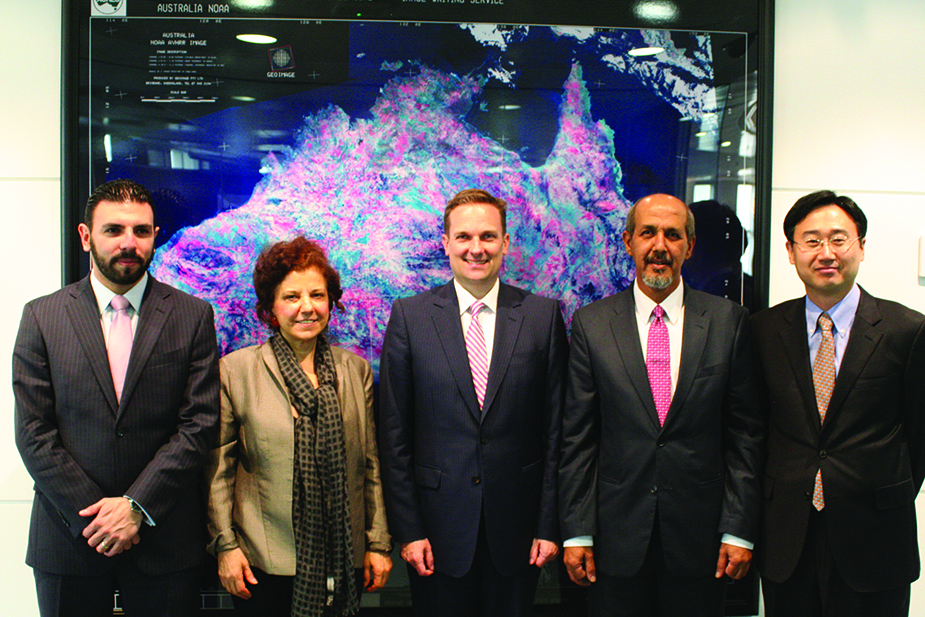The department supported the Trade and Investment Minister’s engagement with Australian business, including through the Trade and Investment Policy Advisory Council and multiple interactions with individual businesses and peak bodies. The department maintained effective and regular contacts with the business sector to inform the development of policies and programs to advance Australian trade and investment interests.
The department worked closely with the Export Finance and Insurance Corporation (Efic) in its new role supporting eligible small and medium enterprises (SMEs) access financial products that will enable them to grow internationally.
Following reforms to the Foreign Investment Framework late in 2015, we worked closely with Treasury and Austrade to promote Australia as a destination for productive foreign investment and enhance the country’s international reputation.
The department coordinated the Government’s engagement across APEC’s broad economic and development agenda. We shaped key leader-level initiatives on services liberalisation and structural reform. We organised workshops to help build the capacity of developing economy policymakers on trade facilitation and to support APEC trade promotion agencies to connect women-led SMEs to export markets.
The department continued to support implementation of major outcomes from Australia’s 2014 G20 Presidency, including the Brisbane Action Plan. Officers posted to Ankara and Beijing worked with host governments in support of Australia’s whole-of-government G20 priorities.
In 2015, the department used Australia’s role in the G20 troika (of past, present and future G20 hosts) to collaborate with Turkey. We lent our support to the initiative to establish the Women 20 engagement group as a way to champion inclusive economic growth and raise the profile of gender equality issues across the G20 membership and work program. We worked closely with China during its 2016 presidency to elevate trade and investment on the G20 agenda and supported China’s initiative to establish a dedicated working group on these topics.
We continued to engage with the OECD agenda and promote its work in a number of areas consistent with Australia’s interests, notably on trade reform and structural barriers to growth. We supported the OECD’s policy analysis contribution as an evidence base for major international agreements on sustainable development, climate change and trade. The department played an active role in OECD negotiations on export credit arrangements to support the uptake of high efficiency low emissions coal-fired power plants and improve energy access in the region.
The department began Australia’s term as 2015–16 Chair of MIKTA, securing agreement to our priorities of international security and energy governance, sustainable development and gender equality.
We engaged with governments and other partners in major tourism markets to identify issues standing in the way of further growth. We updated the Australia–China MOU on tourism cooperation to streamline visa processing and facilitate more independent visitors travelling between the two countries.
The department managed Australia’s financial support for international energy and resource sector development initiatives, including in natural resources governance and clean energy. We contributed to a whole-of-government strategy to comply with the International Energy Agency’s oil stockholding obligation and showcased Australian capacity at the 18th International Conference and Exhibition on Liquefied Natural Gas.
The department managed Australia’s $32 million investment (2012–16) in the Private Infrastructure Development Group, a company with donor shareholders that has helped attract considerable private sector capital and international development finance to infrastructure projects in developing countries and emerging markets—US$1.9 billion in 2015 alone.
Since August 2015, private sector engagement has been a cornerstone of Australia’s aid program. The Business Partnerships Platform, launched in November 2015, created a dedicated platform for accelerated collaboration between business, government and civil society. We developed a range of new strategic partnerships, including with Global Compact Network Australia, Shared Value Project and Fairtrade, to drive faster and more inclusive private sector-led growth in the region.
The first round of the Business Partnerships Platform saw $3.8 million of departmental funding attract $10.2 million in additional private finance for initiatives seeking to generate social and commercial returns in partner countries. The strong response underscores the benefit of partnering with the private sector to achieve development outcomes. The second round will open in 2016–17.

![Trade and Investment Minister Steven Ciobo with DFAT officers at the launch of the Free Trade Agreement portal. [DFAT] Trade and Investment Minister Steven Ciobo with DFAT officers at the launch of the Free Trade Agreement portal. [DFAT]](/sites/default/files/minisite/static/ce9b6f90-cc74-4755-a6fb-5b1423e28f3a/annual-report-2015-2016/wp-content/uploads/2016/10/PHOTO-38-trade-investment-and-tourism-case-study-FTA-portal-FTA-Outreach-case-study-photo-2_CMYK_300dpi.jpg)
![Female member of the Vanilla Growers Association in Tonga with cured vanilla pods for export. [FAIRTRADE ANZ/Rachel Levine] Female member of the Vanilla Growers Association in Tonga with cured vanilla pods for export. [FAIRTRADE ANZ/Rachel Levine]](/sites/default/files/minisite/static/ce9b6f90-cc74-4755-a6fb-5b1423e28f3a/annual-report-2015-2016/wp-content/uploads/2016/10/PHOTO-39-trade-investment-and-tourism-case-study-fairtrade-Vavau-Vanilla_CMYK_300dpi.jpg)